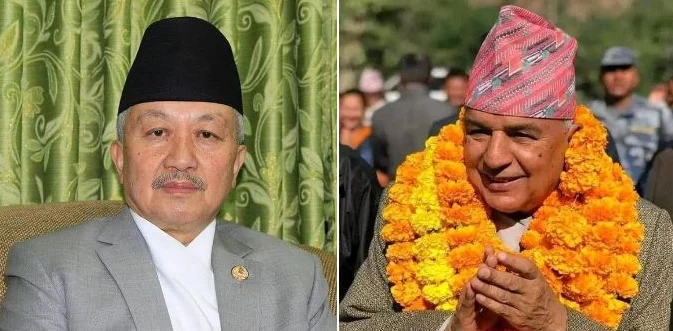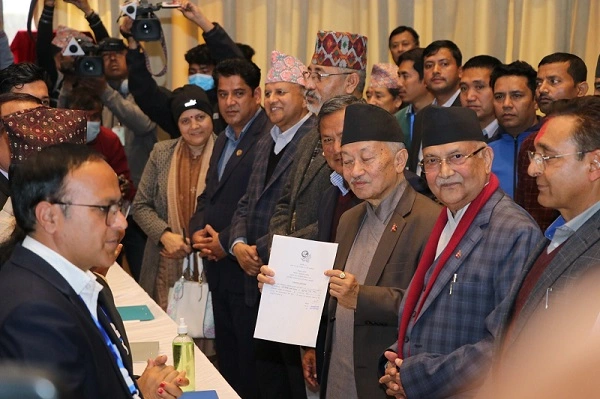

Subhash Chandra Nembag (left) of CPN (UML) and Ramchandra Poudel of the Nepali congress are contesting Nepal’s presidential elections
KATHMANDU: Nepali Congress’ senior leader Ramchandra Poudel and CPN (UML)’s Subash Chandra Nembang are the two contestants in Nepal’s presidential elections slated for March 9.
On Saturday afternoon, Poudel and Nembang fielded their candidacy for the post of the country’s president after the respective parties made an official decision to file their nomination papers earlier in the morning.
Poudel and Nembang are two well-known politicians of Nepal who previously served in different capacities in government, including the speaker of the House of Representatives, the lower of parliament. Poudel once served as home minister while Nembang served as the minister for law and justice.


Poudel is highly likely to win the presidential elections as he has the support of the four ruling parties namely the CPN (Maoist Centre), the Janata Samajbadi Party, the Janamat Party and the Nagarik Unmukti Party, along with three parties outside the government— the CPN (Unified Socialist), Loktantrik Samajbadi Party and Rastriya Janamorcha.
At a meeting held on Friday evening, the above-mentioned parties agreed to give the post of the president to the Congress party as proposed by Prime Minister Pushpa Kamal Dahal, also the chief of the Maoist party.
The meeting took place after CPN (UML) Chairman KP Sharma Oli rejected the idea of Prime Minister Prachanda to appoint the president based on all-party consensus. Oli insisted that Prachanda should accept the UML nominee for the post of president as agreed among the seven-party ruling alliance at the time of the formation of the government in December last year.
Prachanda’s latest move to support the Congress candidate for the presidential elections has all but broken down the existing ruling alliance. The CPN (UML) has accused Prachanda of betraying the ruling alliance by not supporting the UML nominee.
The dramatic turn of events began on Friday when Nepal’s eight mainstream political parties including Nepali Congress and CPN (Maoist Center) agreed to support the Nepali Congress nominee in the presidential elections scheduled for March 9.
With that the old five-party alliance, with the Congress and Maoist party as its key members, has now been revived. Three more parties have been added, making it an eight-party alliance.
Thus, three months after its breakup with Prachanda’s Maoist party, the Congress has been able to make a comeback to power.
Prachanda became the prime minister on December 25 with the staunch support of Oli’s CPN (UML), after breaking an alliance with Deuba’s Congress party. The five-party alliance was formed after the ouster of the government headed by UML Chairman Oli in mid-2021.
By ousting the UML from power, the Congress party will join the Prachanda-led government soon, according to Congress leaders. The Congress and the Maoist party will jointly run the government from the Center to the provincial level.
UML sees ‘foreign hand’ behind Prachanda’s move
Meanwhile, Oli’s party the CPN (UML), which is presently a key coalition partner in the Prachanda-led government, said that the ruling coalition has now collapsed with the prime minister’s decision to elect the Congress nominee as the president.
“Prime Minister Prachanda betrayed the present coalition by agreeing to support the Congress nominee as the candidate for the post of the president. With this, the existing ruling coalition has now collapsed, inviting a fresh round of political instability in the country,” Pradeep Kumar Gyawali, the deputy general secretary of the CPN (UML) told local media. He argued that Prime Minister Prachanda decided to break the current ruling alliance at the behest of external forces.
Despite that breakup of the alliance, UML said that it will not quit the government until presidential elections are held. “We will be part of the government until the presidential elections since the Maoist party has still not told us that they won’t support our nominee for the post of president,” Prithvi Subba Gurung, a leader of the UML, told India Narrative on Saturday.
Gurung said that they will hold dialogue with all the political parties in parliament to ensure victory for their presidential candidate Subash Nemabang.
Meanwhile, Rastriya Prajatantra Party, an ally of the Prachanda-led government, on Saturday, decided to pull out of government and withdraw its parliamentary support in the changed political scenario, especially following the new patch-up between the Maoists and the Congress party.
Nepal is set to get a new head of state in the second week of March, four days before the tenure of current President Bidya Devi Bhandari ends. Likewise, elections to pick the new vice president will take place on March 17.
In Nepal, the president and vice president are elected by an electoral college consisting of members of the federal assembly and members of the provincial assemblies.
The voting weightage of the members of the federal parliament and of the provincial assemblies shall vary as provided for in federal law.
As per Nepal’s law, the president and the vice president should be from different genders or communities. The president and vice president shall have five-year tenure after their elections.
The elections to pick key constitutional positions are taking place three months after Nepal held crucial federal and provincial assembly elections and three two after the formation of the left-dominated new government led by Maoist chief Prachanda.
(Santosh Ghimire is India Narrative’s Nepal Correspondent based in Kathmandu)
Also read: Prachanda ditches Oli, agrees to elect Congress candidate as Nepal’s next president
Union Minister for Communications Jyotiraditya Scindia chaired a key meeting with the Bharat 6G Alliance…
Japanese Ambassador in Kabul, Takayoshi Kuromaya, has called on the Taliban government in Afghanistan to…
The Digital India Foundation (DIF), a founding member of the AI Alliance Network (AIANET), has…
Current bullion market is focusing on a combination of factors which includes direction of US…
National Security Advisor Ajit Doval on Friday slammed foreign media for their reportage of Operation…
The Bharat Utsav, a festival celebrating India's rich culture, heritage, and tradition, has begun in…